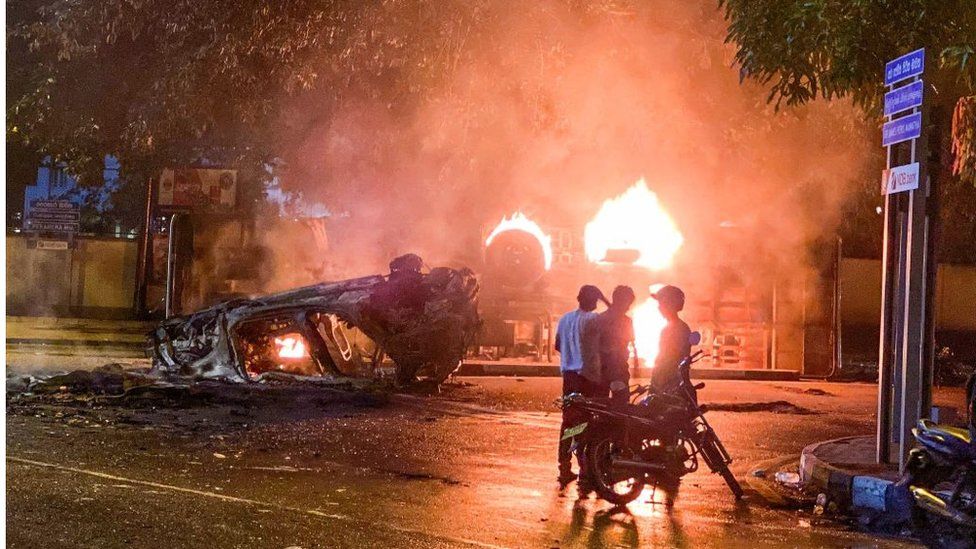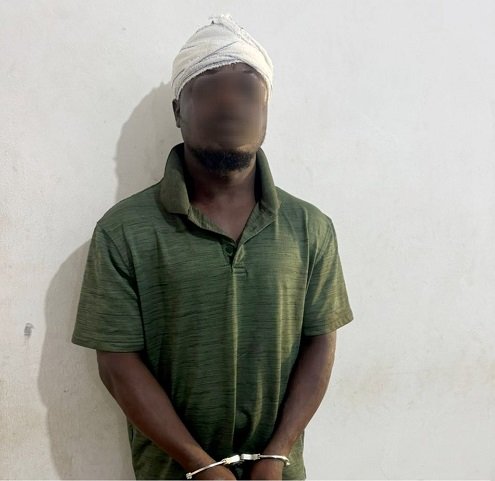Hot!
Sri Lanka tense after protesters torch leaders’ homes in night of unrest

A curfew is in force across Sri Lanka after mobs burned down homes belonging to the ruling Rajapaksa family amid mounting anger at the economic crisis.
The overnight violence capped a day of unrest that saw PM Mahinda Rajapaksa quit, but this failed to bring calm.
Crowds besieged his residence and tried to storm it – he was evacuated to safety in a pre-dawn operation amid tear gas and warning shots.
Seven people have died and more than 190 have been injured since Monday.
The island-wide curfew has been extended to Wednesday morning as authorities seek to quell the violence. Many protesters are still calling for President Gotabaya Rajapaksa, brother of Mahinda, to leave office.https://emp.bbc.com/emp/SMPj/2.44.15/iframe.htmlMedia caption, Watch: Tear gas and physical force disperse pro and anti-government protesters
Reports say more than 50 houses of politicians were burned overnight. Violence abated as day broke, although protests continued despite the curfew.
In the east, protesters gathered in front of Trincomalee Naval Base after unconfirmed reports that Mahinda Rajapaksa had gone there with family members after escaping from his Colombo residence.
Since last month Sri Lanka has been gripped by escalating demonstrations over soaring prices and power cuts.
- Why Sri Lankans want their rulers thrown out
- The divisions behind Sri Lanka’s united protests
- Sri Lankans left desperate over medicine hikes
On Monday, government supporters clashed violently with protesters in the capital Colombo outside Mahinda Rajapaksa’s Temple Trees residence, and then at the main protest site at Galle Face Green.
Police and riot squads were deployed, and tear gas and water cannon were fired at government supporters after they breached police lines and attacked protesters using sticks and poles.
Angry demonstrators retaliated, attacking government supporters and targeting ruling party MPs, including one who shot two people after a mob swarmed his car and then killed himself, according to Sri Lankan police.
As the night went on, mobs of protesters across the country torched houses belonging to the Rajapaksas, various ministers and MPs. This included a house turned into a controversial museum by the Rajapaksas in the family’s ancestral village in Hambantota in southern Sri Lanka.
Footage posted on social media showed homes enveloped in flames as people cheered.
The BBC is not responsible for the content of external sites.View original tweet on Twitter
Areas near the president’s official residence were also set ablaze, according to reports. A municipal lawmaker died in hospital after an attack on his house.
Following Mahinda Rajapaksa’s resignation, protesters attempted to breach the inner compound of Temple Trees where he was staying along with several loyalists, and set fire to a bus outside the home. Police fired shots in the air and tear gas in an attempt to disperse them.
Mr Rajapaksa was flown out of Colombo to an undisclosed location on Tuesday morning.
Elsewhere in Colombo, tensions remained high. Men armed with sticks and rods had established road blocks on the routes leading to and from the airport, and police and security forces – usually a common sight in the area – were nowhere to be seen, reports the BBC’s Anbarasan Ethirajan.
Sri Lanka is facing its worst economic crisis since gaining independence from Britain in 1948, and people are furious because the cost of living has become unaffordable.
The country’s foreign currency reserves have virtually run dry, and people can no longer afford essential items including food, medicines and fuel.
The government has requested emergency financial help. It blames the Covid pandemic, which all but killed off Sri Lanka’s tourist trade – one of its biggest foreign currency earners.
But many experts say economic mismanagement is also to blame.
Source:BBC News
Hot!
Four ‘Pragya’ Operators fined GH¢ 2,400 for obstructing public road at Agbogbloshie

Four tricycle operators, popularly known as ‘Pragya’, have been prosecuted and fined GH¢600 each equivalent to 50 penalty units by the Accra Metropolitan Assembly (AMA) Sanitation Court for obstructing public roads at the Agbogbloshie Market.
The offenders, who were arrested by Public Health Officers of the AMA during a routine enforcement exercise, pleaded guilty to the offence and were subsequently convicted by the court.
The four operators were among the 21 offenders recently arrested at the Agbogbloshie Market for various sanitation and public order violations, including selling on open drains, obstructing walkways, and trading at unauthorised locations.
Speaking after the court proceedings, the Head of Public Health at the AMA, Madam Florence Kuukyi, said the court was lenient with the offenders since it was their first appearance, hence the fine, and warned that subsequent offenders would face stiffer penalties, including imprisonment.
Hot!
Police arrest suspect in Taxi driver murders in Accra

The Ghana Police Service has arrested a man believed to be behind a series of robberies and killings of taxi drivers in the Greater Accra Region.
According to a statement from the Criminal Investigation Department (CID), the suspect, Peter Akakpo, also known as “Dompe,” was arrested on October 13, 2025, at Kasoa-Domeabra.
Police say he is an ex-convict and is believed to have worked with another suspect, Vincent Gbetorglo, who was arrested earlier on June 30, 2025.
The arrests follow investigations into the deaths of two taxi drivers at Sakaman Blue Lagoon on May 9 and June 15, 2025. Police say the suspects contacted the victims before the attacks.
The Anti-Armed Robbery Unit of the CID led the investigation, using intelligence and surveillance to track down the suspects.
Police say efforts are being made to recover the vehicles of the murdered drivers.
The CID assured the public that investigations are still ongoing and promised to provide updates as new information emerges.
By: Jacob Aggrey






